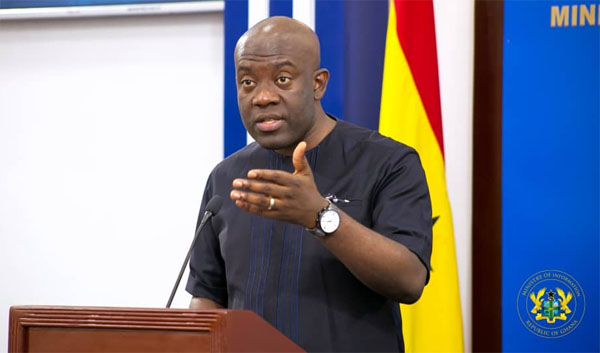Member of Parliament for Ofoase-Ayirebi and former Minister of Information, Kojo Oppong Nkrumah, has filed a private member’s bill seeking major amendments to Ghana’s Public Financial Management Act (PFMA).
The proposed legislation aims to prevent government Ministries, Departments, and Agencies (MDAs) from accessing public funds if their policies and programs have not been certified by the National Development Planning Commission (NDPC).
Oppong Nkrumah filed the bill on Tuesday at the Office of the Clerk to Parliament. The legislation, if passed, will introduce three key clauses that are designed to tighten Ghana’s public spending architecture and align all government programs with the country’s official development framework.
Speaking after submitting the bill, the MP said too many MDAs are currently receiving funds for projects that are not in line with national priorities.
“A number of ministries, departments, and agencies are not going through the required process of NDPC certification. That is a loophole in the law that I seek to block with this amendment,” he said.
The bill proposes that the Minister for Finance be barred from releasing any funds to MDAs that have not submitted their development plans for NDPC approval. It also seeks to prohibit the use of internally generated funds (IGF) for projects that are not aligned with the national development strategy. Additionally, it introduces criminal liability for officials who approve or facilitate spending on uncertified programs.
“What I’m doing is blocking that hole,” Oppong Nkrumah explained. “If you don’t certify your plans and we still allow you to spend money building new headquarters or starting new projects, then you are on a frolic of your own. That must stop.”
He added that MDAs often claim that IGF is exempt from these rules because it is “their own money,” but insisted that all such funds are still public resources.
“Before you collect that money, the Fees and Charges Act has to be passed. That makes it public money. Its use must be in consonance with the national development plan,” he said.
The bill also introduces an offence for any person who authorizes or facilitates such expenditure without NDPC approval, tying it to sanctions under Section 98 of the current Public Financial Management Act.
Addressing concerns that the bill could increase bureaucracy in government operations, Oppong Nkrumah defended the need for strong processes.
“Bureaucracy is important because it compels people to follow laid-down rules. It ensures that we’re all going in a direction that we’ve collectively agreed on,” he said.
He noted that current monitoring and evaluation of development plans is weak and often conducted on an ad hoc basis. He hinted that further legislative efforts may be required to amend the National Development Planning (System) Act, Act 480, to strengthen the overall planning framework.
Oppong Nkrumah expressed optimism that the bill would receive support from both sides of the House, including from the government and the Majority caucus.
“The matter of protecting the public purse is a matter of common interest. This government has made strong arguments about why it wants to do so, and I believe they should see this as something that complements their efforts,” he said.
The bill is expected to be officially laid before Parliament in the coming weeks. If passed, it would mark one of the most significant overhauls of Ghana’s public financial management system in nearly a decade, with the goal of ensuring that government spending is closely tied to the nation’s long-term development priorities.



